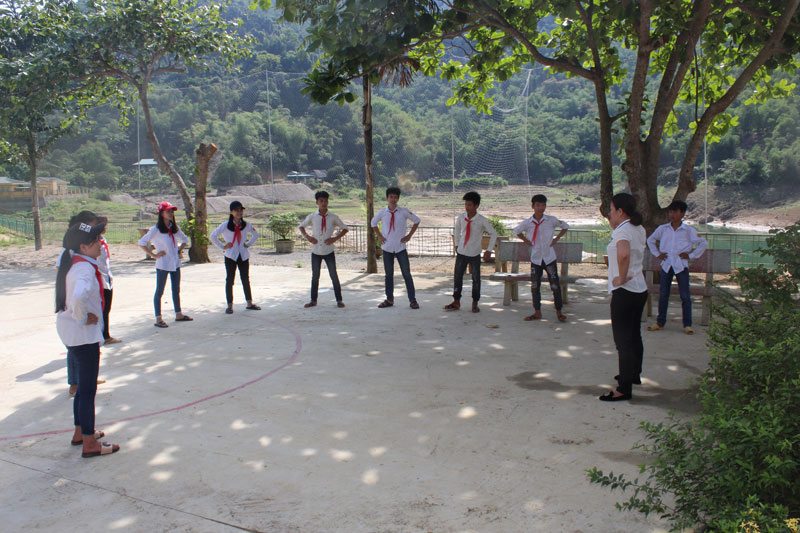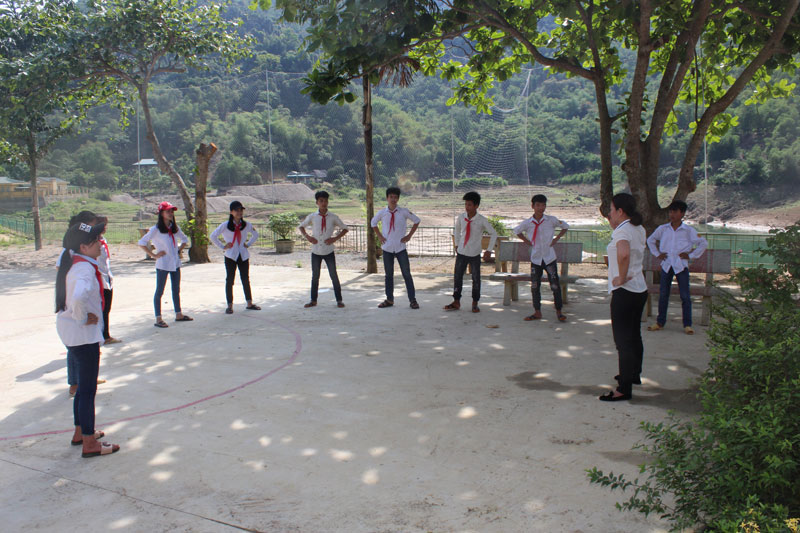
(HBO) – By life skills education, students have been given a chance to strengthen the capacity and quality, and promote positive, active and creative characteristics. These students feel self-confident and brave in all activities. Moreover, life skills education also has positive meaning in which it helps students consolidate the knowledge learned in the class. As a result, these students are equipped with life skills, collaborative communication and self-awareness. Additionally, they can learn how to express empathy and cultural behavior as well as make decision and solve problems. Finally, students are able to enhance their creative thinking, emotional management and face challenges. The outstanding result of life skill education is that students could gain the knowledge to use in practice and take care of themselves and their families.

Students in Hien Luong Secondary School (Da
Bac district) are equipped and instructed swimming safety skills and drowning
prevention.
According to the statistics of Department of
Education and Training, there are 43 schools in Da Bac district (including 20
kindergartens, 12 primary schools, 11 secondary schools and 10 high schools).
By the end of 2017 to 2018 school year, 100 percentages of the schools have
provided life skill education for students with the participation of 1368
teachers. Life skills education was organized by the schools through these
activities which were integrated in daily lessons, extracurricular classes,
creative experiences and talent clubs. At the moment, all of schools have
established many clubs such as elementary mathematics clubs, elementary
literatures clubs, English clubs, music clubs, chess clubs and football clubs.
Especially, the work of life skills education
has been inspired beautifully and attractively by these extracurricular classes
with practical and informative topics such as accident and injury prevention,
traffic safety, environmental protection and self-defense skills. Also, they
popularize life skills education and health protection.
In order to improve the quality of life
skills education, the schools have strengthened coordination with the local
authority, the families and other organizations to inform the development of
students, consult further about how to train and educate children. For example,
they could give students chances to visit the historical sites and support
finance for schools to organize extra-curricular activities
The emulation movement "Hoa Binh joining hands to build new-style rural areas” has been widely spreading, becoming a driving force that motivates the localities to renew rural landscapes and improve the material and spiritual lives of the residents. In this movement, the people play a central role-both as the main implementers and direct beneficiaries of its outcomes.
In response to the global digital revolution, Hoa Binh Newspaper is transforming itself into a modern and multi-platform media hub, blending cutting-edge technology with a restructured newsroom and a new generation of tech-savvy journalists.
Hoa Binh province’s Association of the Elderly recently held a conference to review the project on expanding the inter-generation self-help club model until 2025.
In a move to implement Resolution No. 57-NQ/TW, issued on December 22, 2024 by the Politburo, which targets breakthroughs in science-technology development, innovation, and digital transformation, the Hoa Binh provincial Department of Health has issued a plan to roll out the "Digital Literacy for All” campaign within the local health sector.
An Nghia Commune (Lạc Sơn District) is one of the communes that achieved the tha standard of the national new rural area in 2018. Entering a new development phase, the commune is now trying to meet the criteria for the advanced new rural development. With the strong political will and the public consensus, the commune is gradually overcoming the challenges to reach this goal, aiming for the sustainable development.



